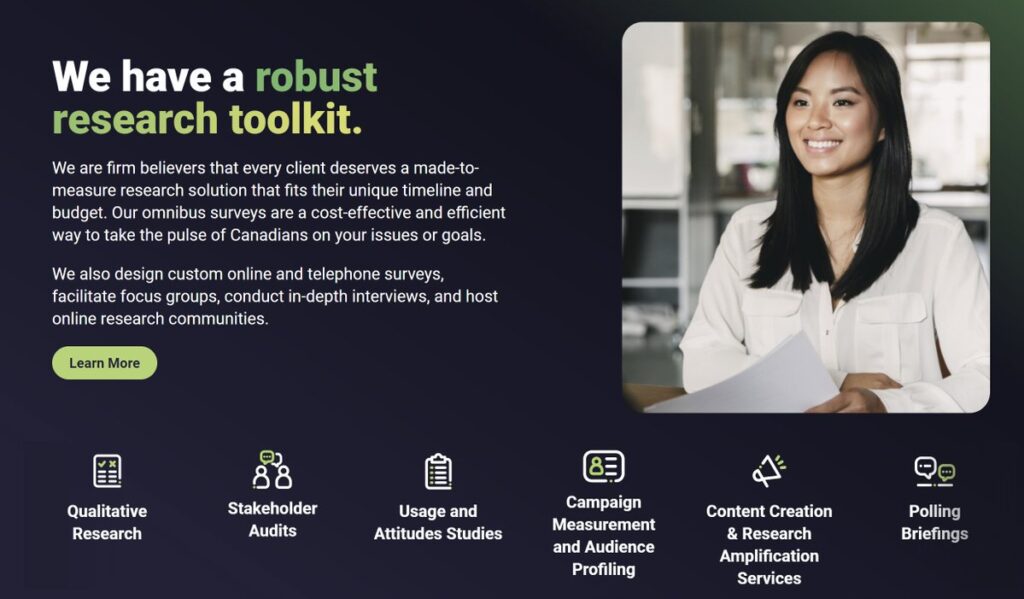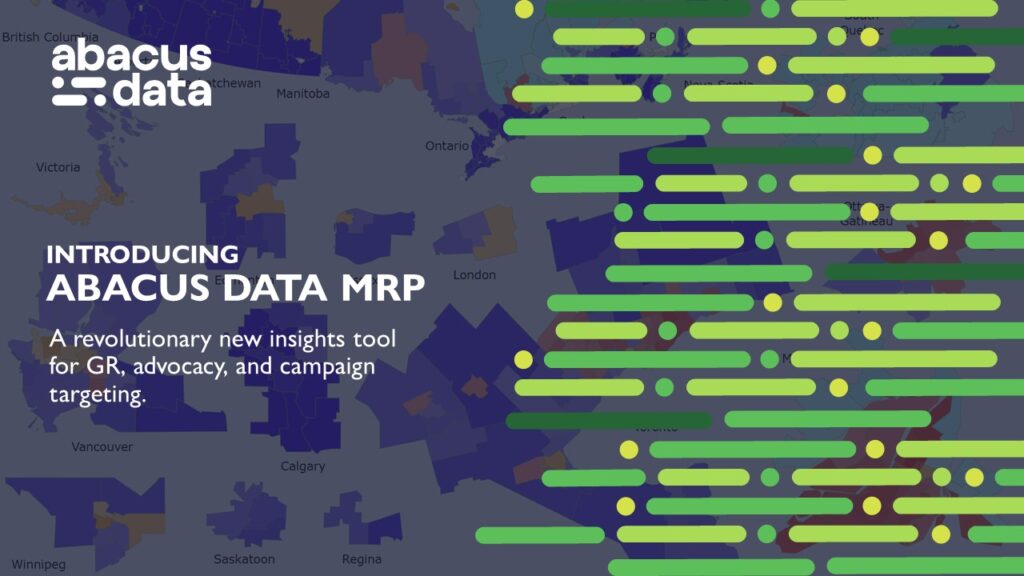Abacus Data Poll: Liberals and Conservatives tied, but advantage is still with Carney’s Liberals.
As the first week of Canada’s 2025 general election comes to an end, our latest Abacus Data survey—our third poll of the campaign—finds the Liberals and Conservatives neck-and-neck nationally, with each party securing 39% of the committed vote among all eligible voters.
Among those most likely to vote, however, the Liberals edge ahead by two points, giving them a slim but notable advantage in a race that was once firmly in Conservative territory.
In this report, I’ll unpack the headline numbers, explore shifting demographic allegiances, and consider the increasingly important role of external factors such as Donald Trump’s presidency in shaping Canadian voters’ perceptions and choices
Liberals and Conservatives are tied nationally
Among all eligible voters surveyed, the Liberals and Conservatives remain deadlocked at 39% each. When we focus on likely voters—those who tell us they will “definitely” vote—Liberal support ticks up slightly to 41%, while the Conservatives hold at 39%. Although a two-point lead may seem modest, it represents a meaningful shift from earlier in the year and the efficiency of the Liberal vote means even a tie will lead to a Liberal government.
The New Democratic Party (NDP) remains in third place at 11% nationally. Given the party’s recent struggles, it will need to recalibrate quickly if it hopes to gain momentum and position itself as a viable alternative for progressive voters uneasy about either a Liberal or Conservative government.


Among all committed voters, the regional stories continue to evolve.
British Columbia: The Liberals and Conservatives are statistically tied, underscoring a highly competitive race in a province that has been a three-way battleground in previous cycles.
Ontario: Liberals hold a three-point lead, an improvement over their standing even a few weeks ago, suggesting that Liberal Leader Mark Carney’s campaign messaging may be resonating in the country’s most populous province.
Quebec: The Liberals now outpace the Bloc Québécois by 13 points, demonstrating a continued ability to consolidate the federalist vote and win over soft nationalist voters.
Atlantic Canada: The Liberals enjoy a commanding 21-point lead, building on the East Coast’s historical tilt toward the party in recent decades and reverting a shift to the Conservatives we had seen over the past two years.


One of the most notable shifts in this wave is the clear movement of young voters and older voters toward the Liberal Party:
Young Voters (18–30): The Liberals have taken the lead among younger voters, having closed the gap that the Conservatives have established for the past few years.
Boomers (60+): The Liberal lead among Boomers has expanded. The Conservatives continue to do well with the 45–59 demographic, but the fact that older voters—traditionally seen as more Conservative-friendly—are warming to the Liberals highlights how the dynamics of this campaign differ from past elections.
Millennials and Gen X (roughly ages 30–44 and 45–59): The Conservatives continue to hold a lead in these cohorts, particularly among those worried about day-to-day affordability. Pierre Poilievre’s strong emphasis on cost-of-living issues, housing, and the conomy may still resonate with these groups balancing mortgages, child care, and the challenges of raising families.
Growing Liberal Pool, Static Conservative Base
One of the fundamental indicators we track is the size of each party’s accessible voter pool—the proportion of Canadians who would consider voting for a party. Our latest data show the Liberal accessible voter universe has expanded slightly, while the Conservative pool remains essentially unchanged from the previous wave. If you picture this as an angler casting a net, the Liberals now have a larger net (more fish to catch), meaning that with effective messaging and ground organization, they can potentially convert more Canadians into active supporters on election day. The Conservatives, while still holding a sizeable base, appear to have plateaued in their capacity to attract new supporters.


Voter Enthusiasm and Desire for Change
Another critical finding is that 68% of Canadians now say they are “definitely” going to vote, a four-point jump since our last survey. Interest in the election continues to be markedly higher than in the 2021 campaign. Liberal supporters are more likely to say they will vote than Conservative and NDP supporters.
This desire to vote reflects heightened interest in the election. Overall, 72% of Canadians say they are very interested in the coming federal election (rating their interest an 8 to 10 on a 10-point scale). Older Canadians (those 60 and over) show the strongest engagement at 85%, compared to only 55% among those aged 18 to 29. Regionally, Saskatchewan and Manitoba top the list at 80%, with Quebec notably lower at 60%. There is also a modest gender gap, as 76% of men report a high level of interest versus 69% of women. Finally, Liberals are currently the most tuned-in supporters at 81%, followed by Conservatives at 77%, while the NDP base trails behind at 64%.

At the same time, the desire for change appears to be softening. While a majority still say they would prefer a change in government, those who strongly desire change have dipped from previous waves. Our poll also finds that 23% of Canadians now definitely want to see the Liberals re-elected—up from earlier readings. Taken together, these trends suggest the “time-for-a-change” sentiment that once fuelled Conservative momentum may not be as potent as it was, giving the Liberals some breathing room to solidify support. But there is still an audience for a change message.


Leader Favourability and Perceptions
Mark Carney (Liberal): Carney remains the most popular leader, with 42% positive impressions versus 31% negative, for a net +11 favourability. His reputation as a steady hand in times of turbulence—alongside a polished performance so far on the campaign trail—has seemingly built trust among a cross-section of Canadians.
He tends to perform especially well in Atlantic Canada and Ontario, where majorities lean positive, and he also garners higher approval among older Canadians (60+) than among younger cohorts. Carney’s support skews more female than male, although men are still more positive than negative on balance. The political breakdown shows that Liberal supporters are by far the most enthusiastic about him; in fact, well over half hold a favourable view. By contrast, Conservative voters split more evenly, though they tilt negative overall, and some NDP partisans remain neutral or only mildly positive. These dynamics help explain why Carney’s net favourability surpasses most other leaders at this stage of the campaign.

Pierre Poilievre (Conservative): Poilievre’s negatives have inched up to 45%, while his positives sit at 38%, resulting in a net of -7. A slight dip from our last wave, this shift may reflect increased scrutiny as the campaign heats up, particularly on his approach to economic policy and rhetorical style.
He does best among men, older Canadians, and especially among people who currently support the Conservatives—in these groups, a clear majority have a favourable impression of him. Regionally, Poilievre’s strongest support is in Alberta and the Prairies, where almost half or more view him positively, whereas he struggles most in Quebec, where fewer than one in three feel positively about him and a clear majority are negative. By contrast, women, younger voters, and those who support the Liberals or New Democrats register higher levels of dislike for Poilievre, pushing his net ratings downward in those segments.

Jagmeet Singh (NDP): Singh continues to be challenged by higher negatives relative to his positives, leaving him as the least popular federal leader. While some loyal NDP supporters remain enthusiastic about Singh’s leadership, the party has struggled to convert broader frustration about affordability into direct support.


Carney vs. Poilievre: The Leadership Gap
A particularly revealing set of questions asked Canadians to compare Mark Carney and Pierre Poilievre on attributes like “captaining a ship through a rough storm,” “finding common ground to solve a dispute,” and “standing up to a bully.” Last week, Carney only held a two-point lead over Poilievre on crisis leadership (“captaining a ship”); this week, that gap has grown to seven points. He’s also ahead by nine points on “finding common ground” and four points on “standing up to a bully.” These incremental leads, while not decisive on their own, can shape the campaign narrative—especially for voters who are still sizing up the two leaders on the national stage.

The Trump Factor and Competing Frames
One of the most intriguing insights from this poll comes from retesting our “election frames.” We asked Canadians to choose whether this election is:
- Primarily about which party can best handle the challenges posed by Donald Trump, now President of the United States once again; or
- A question of whether it’s time for change at home in Canada, or affordability, or the economy.
A majority (54%) said the election is about dealing with Trump’s impact on Canada, while 46% said it is more about changing our domestic leadership. However, when we frame it as cost of living vs. dealing with Trump, affordability wins out by a margin of 58% to 42%. In other words, while Canadians generally care about how any prime minister will navigate the Trump presidency, pocketbook issues still dominate for most voters when forced to make a choice.

The differences in vote intention under these frames are profound. Those who see the election primarily in terms of opposing Trump and ensuring Canada’s interests are defended lean decisively toward the Liberals. Conversely, those focused on cost-of-living challenges lean strongly Conservative. Understanding these conflicting frames—and which one resonates most with swing voters—may very well determine the outcome of the election.

The Upshot: Advantage Liberal
Our third poll of this campaign confirms that the 2025 federal race is a tight, compelling contest. The Liberals have managed to narrow the Conservative advantage and now find themselves locked in a dead heat among eligible voters, with a modest edge among those most committed to casting a ballot. Regionally, gains in Ontario and Atlantic Canada are bolstering the Liberals, while the Conservatives are clinging to their core support in the Prairies and among specific age cohorts (Millennials and Gen X).
Meanwhile, the why of this election remains contested in the public mind. Economic concerns—especially cost of living—loom large. At the same time, Donald Trump’s threats and tariffs have many Canadians worrying about Canada’s place in a suddenly more uncertain international landscape. Liberals have seized on these concerns, positioning Mark Carney as the best captain in a storm, while Pierre Poilievre is still trying to focus minds on inflation, housing, taxes, and government spending hoping these can find a way to overshadow anxieties about Trump.
With a month left until voters head to the polls, the race remains fluid. But one thing is clear: Canadians are more engaged, the stakes feel higher, and the leaders face a voter population more prepared to be swayed by events on both sides of the border. Whether that heightened engagement redounds to the benefit of the Liberals, the Conservatives, or an insurgent NDP campaign looking to recapture disenchanted progressives remains one of the central questions of this pivotal 2025 election.

Methodology
The survey was conducted with 1,800 adult Canadians over the age of 18 from March 24 to 27, 2025. A random sample of panelists were invited to complete the survey from a set of partner panels based on the Lucid exchange platform. These partners are typically double opt-in survey panels, blended to manage out potential skews in the data from a single source.
The margin of error for a comparable probability-based random sample of the same size is +/- 2.3%, 19 times out of 20.
The data were weighted according to census data to ensure that the sample matched Canada’s population according to age, gender, educational attainment, and region. Totals may not add up to 100 due to rounding.
This survey was paid for by Abacus Data Inc.
Abacus Data follows the CRIC Public Opinion Research Standards and Disclosure Requirements that can be found here: https://canadianresearchinsightscouncil.ca/standards/

ABOUT ABACUS DATA
We are Canada’s most sought-after, influential, and impactful polling and market research firm. We are hired by many of North America’s most respected and influential brands and organizations.
We use the latest technology, sound science, and deep experience to generate top-flight research-based advice to our clients. We offer global research capacity with a strong focus on customer service, attention to detail, and exceptional value.
And we are growing throughout all parts of Canada and the United States and have capacity for new clients who want high quality research insights with enlightened hospitality.
Our record speaks for itself: we were one of the most accurate pollsters conducting research during the 2021 Canadian election following up on our outstanding record in the 2019, 2015, and 2011 federal elections.
Contact us with any questions.
Find out more about how we can help your organization by downloading our corporate profile and service offering.














































































